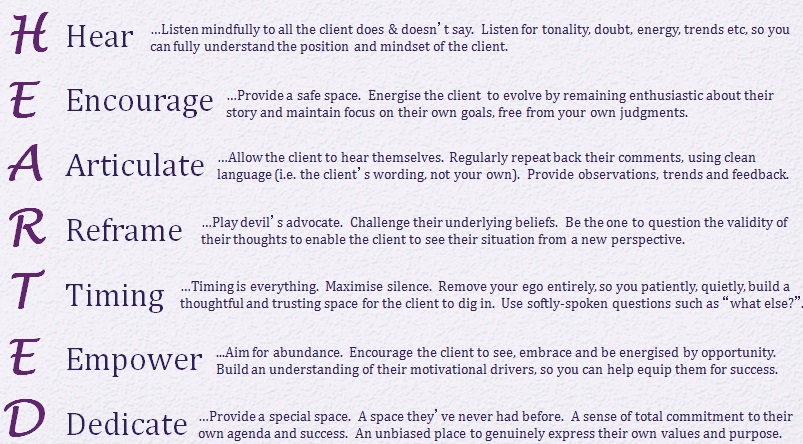Obstacles & Opportunities

Obstacles: The road to success is rarely smooth & straight, therefore obstacles & challenges for the client along the way will be inevitable. Addressing these head on in advance of them occurring can help prepare and provide strength within the client. Also, this foresight of the obstacle(s) can be sufficient to consciously prevent defeat, as there is a greater sense of rationality & mindfulness when it occurs.
Opportunities: This is where the impetus and energy begin to emerge. The excitement, the vision and the hope. What resources, people, ideas, markets, perspectives ways of doing things etc are out there? Now is the time to look forward, positively. This requires digging deep; creatively.
Relevant Coaching Tools & Methodology:
Appreciative Inquiry will be important to this phase, as it centres around an inquiry into the environment, mindset and thoughts of the client. Leading this from a positive, appreciative state can energise and build the confidence of the client to take action.
NLP methodology can also support the client in maintaining a positive mindset, by giving consideration to the positive role models available, the optimal ways to communicate etc.
Creating Structures with the client can help ensure greater sustainability of their actions/commitments. Bringing awareness to their preferred documentation, accountability, thought structures etc, can remove obstacles & optimise the opportunities.
Responsibility vs. Blame as a power tool is intended here to generate ownership of both the foreseen problems and the opportunities.
Responding vs. Reacting can help to create a state of mindfulness in the client of the journey they are about to embark, so they are fully prepared to deal with the twists, bumps & challenges.
Power Questions that can be applied through the ‘Obstacles & Opportunities’ phase are:
Obstacles
Opportunities
Leaping & Learning

Leaping: The time for action! Leaping is where bravery, courage and determination surface, driving the client to leap forwards with energy and vigor. It’s no longer about thinking and planning; it’s about doing. In order for change to happen, the client must take action.
Learning: An open & flexible mind is critical for successful evolution, supported by the NLP presupposition that “there is no failure, only feedback”. Not all steps forward may turn out as planned, and so the client having flexibility and openness to learn and adapt will be critical to the degree with which they evolve.
Relevant Coaching Tools & Methodology:
Action vs. Delay is paramount at this stage in order for the client to take their first ‘leaps’. For the client to experience tangible changes, they must move from a state of reflection/consideration into action.
Creating accountability must take place to ensure that the client has ultimate ownership of their planned actions.
Commitment vs. Trying is something to watch out for, to ensure that clients remain fully engaged in the process, and to understand if/what may be holding them back from fully committing.
Appreciative Inquiry is a positive and supportive way to address the essential learning during this phase. Analysing the causes and reasons for success, the positive emotions, the pride in achievements etc can reinforce positive behaviour and build an understanding of elements to sustain/repeat.
Acknowledgement of your clients bravery, learning and achievements is critical. For many adults, learning can be a vulnerable place where people become demotivated by perceived failure. So acknowledgment can help reward and reinforce learning.
Power Questions that can be applied through the ‘Leaping & Learning’ phase are:
Leaping
Learning
Evolving & Enjoying

Evolving: In order for a client to enjoy sustainable success from their coaching investment, they must evolve, both during and after the process. This phase is about preparing for the future; reality beyond coaching. It’s about stretching the client, building resilience, flexibility and an openness to unconsidered future situations/opportunities.
Enjoying: This final reflection with the client solidifies their commitment and feelings about the coaching outcomes. It is intended to deepen their sense of mindfulness and intensify the positive achievements, developments and changes that have been made. This positive energy can also act as a catalyst for future evolution.
Relevant Coaching Tools & Methodology:
NLP methodology can help ensure a positive perspective is instilled in the client so they know how to re-consider/reframe their perspective through future potential setbacks.
Creating Structures will be essential to ensure the client has a conscious awareness of the factors required for sustainable success.
Power questions here can help the client to consider their future in ways they may not have given thought to. This can add significant value in their future success and leave them with a sincere sense of appreciation for the coaching process.
Self Management is a construct to be explored in this final phase so the client is clear how they intend to manage their time, progress, accountability etc.
Acknowledgement plays a huge part in helping the client to enjoy and celebrate their successes. This is a great time to share the evolution that you have witnessed and acknowledge the clients effort, accomplishments etc.
Power Questions that can be applied through the ‘Evolving & Enjoying’ phase are:
Evolving
Enjoying
Bringing HEART to the process

As this model is generally designed for the life and transformational coaching domain, the coaches style will play a pivotal role in the degree of success achieved. Discussing topics that centre around the heart, that centre around vulnerability and also authentic happiness require a special sense of compassion and sensitivity from the coach.
The ‘HEARTED’ component of this model is therefore intended to remind the coach of the essential qualities required of themselves. In no particular order, these qualities are each important to bring a sense of heart to the coaching process; to make it a safe and encouraging space for the client to dig deep and be courageous.

